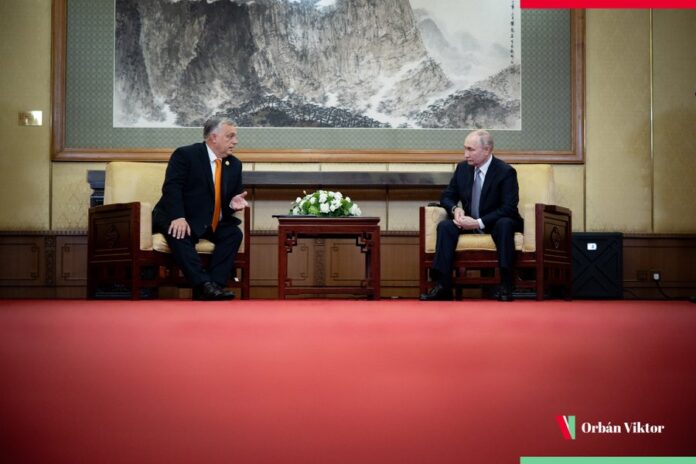Hungarian Prime Minister Viktor Orbán met with Russian President Vladimir Putin in Beijing, distancing Hungary from the EU values and politics.
“Meeting with President Putin in #Beijing. Everyone in Europe is asking the same thing: can there be a ceasefire in Ukraine? It’s crucial for Europe, including Hungary, that the flood of refugees, sanctions and fighting should end!”, Orbán posted on X.
During the meeting, Putin expressed his satisfaction that relationships with several European countries, including Hungary, “are being preserved and developed.”
However, it is unclear which specific countries the Russian leader was referring to, as many EU-member states increasingly support Ukraine. Slovakia has a new government that openly declares its pro-EU and pro-NATO stance. In a significant development, Poland saw a major shift away from the far-right populist axis, with the far-right PiS party likely to be replaced by a pro-EU government.
Orbán expressed his government’s interest in continuing economic cooperation with Russia “as long as possible,” as reported by the Kremlin.
Orbán has a clear pro-Kremlin position. A few times ago, he stated his belief that Ukraine is financially unstable and no longer independent due to its reliance on international support.
On 3 October, Budapest proposed reducing the €50 billion European Union funding package for Ukraine to €25 billion.
The only European at the Summit
Orbán and Putin are currently in China’s capital to attend the Belt and Road Forum, which will take place on October 17 and 18. The forum aims to showcase the achievements of China’s Belt and Road Initiative, a global infrastructure project that seeks to promote trade and investment along the ancient Silk Road routes.
Orbán is the only EU leader participating in the summit. Despite Hungary’s membership in the EU and NATO, Orbán’s government has maintained ties with China and Russia. On October 17, Orbán met with Chinese leader Xi Jinping.
Under Orbán’s leadership, Budapest has consistently opposed international sanctions against Russia and has blocked funding for Ukraine. Brussels’ attempts to counter Budapest’s anti-EU position have met resistance from the Polish government. The authoritarian bloc formed by Warsaw and Budapest has undermined several EU policies.
Orbán strengthens ties with Kremlin
Peter Szijjarto, the Foreign Minister of Hungary, has visited Moscow numerous times. He has made five visits since the Russian invasion of Ukraine in February 2022, with his most recent visit being on 12 October. Szijjarto’s visit to Moscow was to attend the Russian Energy Week forum, as reported by Russian media.
He previously attended the same forum in October 2022 and also made a trip to Russia in July 2022 to discuss natural gas transportation. In April 2023, he revisited Moscow for energy-related talks. In June 2023, he was the only high-ranking official from the West to attend the St. Petersburg International Economic Forum, held under the Russian President’s patronage.
On September 22, Szijjarto told the Russian state news agency TASS that he believed new sanctions against Russia were “unnecessary” and would cause more harm to Europe than to Russia.
Polish elections’ results isolate Orbán
The outcome of the Polish elections held last Sunday marks a significant defeat for the far-right party of Jarosław Kaczyński, the Law and Justice (PiS). It also signals that Hungary’s prime minister, Orbán, will likely be left isolated in the EU. The anticipated change of government in Warsaw implies that Hungary will lose its last ally within the EU, making it difficult for the Hungarian government to coerce the EU. Orbán’s future looks gloomy as the Russians are utilising him and his government, but they have refrained from providing financial aid. Additionally, many in the EU desire to see Hungary removed from the block.

